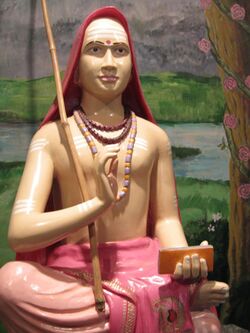Religion:Kanakadhāra Stotram
The Kanakadhara Stotram (Sanskrit: कनकधारा स्तोत्रम्, romanized: Kanakadhārāstotram) is a Hindu hymn (stotram) composed in Sanskrit by the theologian Adi Shankara.[1]
Etymology
Script error: The function "transl" does not exist. means "the holder (Script error: The function "transl" does not exist.) of gold (Script error: The function "transl" does not exist.)", and the hymn is called by this name since legend has it that when Adi Shankara recited it, the goddess Lakshmi showered a stream of gold within the hut of his poor Brahmin benefactor.[2]
Description
The hymn was written in the 8th century CE by Adi Shankara, a revered Hindu philosopher.
According to tradition, as a young boy, Adi Shankara was out seeking alms to prepare his lunch and happened upon the doorstep of a very poor Brahmin woman. Having nothing edible in her home, the lady frantically searched her house, only to find a single gooseberry fruit, which she then hesitantly offered to Shankara. Shankara was so moved by the incredible selflessness of this woman that he burst forth into poetry and sang 22 stanzas in praise of the goddess Lakshmi. Pleased by the beauty of the hymn, the goddess instantly showered the lady's house with gooseberries made of pure gold.[3]
Hymn
The first hymn of the Kanakadhara Stotram is as follows:[4]
aṅgaṃ hareḥ pulaka-bhūṣaṇam āśrayantī
bhṛṅgāṅganeva mukulābharaṇaṃ tamālam |
aṅgīkṛtākhila vibhūtir-apāṅgalīlā
mā-galyadāstu mama maṅgala-devatāyāḥ
May Her glance, who abides in the body of Śrī Hari (who wears supreme happiness as ornament), just as the bees takes shelter in the profusely blossomed (buds) Tamāla tree, Who is the abode of all superhuman powers, and Who is all auspiciousness, be auspicious to me.
References
- ↑ Vanamali (2008-07-21) (in en). Shakti: Realm of the Divine Mother. Simon and Schuster. pp. 208. ISBN 978-1-59477-785-1. https://books.google.com/books?id=3FwoDwAAQBAJ&dq=kanakadhara+lakshmi&pg=PT208.
- ↑ Nithyananda (Paramahamsa.) (2009) (in en). Bhagavad Gita Demystified Volume 2. eNPublishers. pp. 82. ISBN 978-1-60607-072-7. https://books.google.com/books?id=KDgyzwT9-p8C&dq=kanakadhara+gold&pg=PA82.
- ↑ Venugopal, Meditation Guru (2022-02-07) (in en). Meditations With the Guru: Stories on how to meditate for health, happiness, peace and success. Notion Press. pp. 109. ISBN 978-1-68563-903-7. https://books.google.com/books?id=vptcEAAAQBAJ&dq=adi+shankara+gooseberry&pg=PT109.
- ↑ "Kanakadhārā-Stotram". https://www.speakingtree.in/blog/kanakadh-r-stotram.
External links
- Kanakadhara Storam, translated by P. R. Ramachander
- Learn Sri Kanakadhara Stotram


